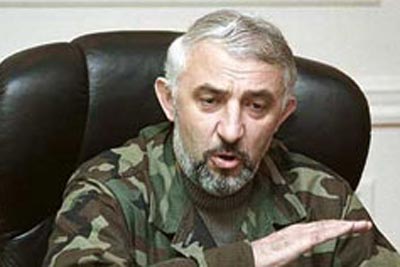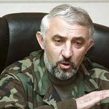
MASKHADOV’S CEASEFIRE OBEYED IN CHECHNYA, NOT IN DAGESTAN
Publication: Eurasia Daily Monitor Volume: 2 Issue: 28
By:

On January 15, the Chechen rebel leader Aslan Maskhadov issued a special order to stop all military operations both inside and outside Chechnya until the end of February (EDM, February 4; Caucasus Times, February 4). According to an officer at the commandant’s headquarters in Chechnya, there have been no reports of assaults or bombings against federal forces thus far. “The militants seem to have taken a break,” he noted (Caucasus Times, February 4). Radio Liberty and Reuters also have reported that the military situation in the Chechnya became unexpectedly calm at the beginning of February. A February 6 press release by the Command of the Federal Troops in Chechnya commented, “For the last 24 hours the situation was comparatively quiet (newsru.com, February 6).
However, the Russian military command distrusts Maskhadov’s “goodwill gesture.” An unnamed officer from the Russian Ministry of Defense called Maskhadov’s peace initiative “wolf tricks.” He continued, “They [the rebels] talk about peace, and at the same time use the pause to regroup their forces” (Gazeta, February 7). The federal command seems rather frightened by Maskhadov’s order. The Russian-Chechen Friendship Society reported that, on February 4, a convoy of 207 military vehicles and armored personnel carriers entered Chechnya from neighboring Ingushetia (RCFS Press Release No. 1140, February 6).
In his latest interview with Kommersant, Maskhadov bluntly answered a question about what he and his comrades would do if the Kremlin continues to reject peace talks. He explained that Chechen winters typically end in February, and traditionally the rebels become more active when spring arrives (Kommersant, February 7). Thus, Maskhadov has given Russian President Vladimir Putin an ultimatum: either stop the war or prepare for trouble in the North Caucasus this summer.
According to Jamestown Foundation sources in Moscow, Dmitry Kozak, Putin’s envoy to the Southern Federal District, has submitted a report on the outlook for the North Caucasus in 2005. The report says that the coming summer campaign will be even more difficult than in 2004, which included a raid on Ingushetia in June and an attack on Grozny on August 23.
However, the rebels did not stop all their military operations, possibly to make the Russian authorities more cooperative. On February 4, the group of Dagestan militants known as Sharia Jamaat issued a statement saying that the rebels were waiting for Maskhadov to issue a special ceasefire order regarding Dagestan. Sharia Jamaat noted that Maskhadov’s order only mentioned Chechnya and Russia, and, since the Dagestan insurgents do not recognize Dagestan as part of the Russian Federation, they would continue to fight (Kavkazcenter.com, February 4).
The separatists appear to believe that the only way they can force the Kremlin to the negotiating table is by turning the largest Caucasus republic into another war zone. Sharia Jamaat is accumulating good success rates with guerilla warfare and sees no reason for its members to lay down arms. Despite the fact that federal troops and local police taskforces managed to destroy rebel cells in the cities of Makhachkala and Kaspiisk (see EDM, January 19), the attacks are now focused on Makhachkala, the capital of Dagestan.
The insurgents are using increasingly creative urban warfare tactics. On January 31, police received an anonymous tip about armed persons hiding in an apartment building in Makhachkala. When the police came to investigate, they were blown up by a booby trap installed at the building’s entrance (RIA-Novosti, January 31). In Makhachkala on February 2, militants ambushed a motorcade for Magomed Omarov, Dagestan’s deputy interior minister, killing him in the shoot-out. According to Vremya novostei, Omarov had coordinated all major anti-insurgent operations in the republic. Omarov usually traveled in an armored Mercedes, but this day he was in an ordinary car because his Mercedes was being repaired. This convenient timing suggests that the insurgents might have high-placed agents inside the local police (Vremya novostei, February 4). Two days later, militants bombed the police K9 training center, killing several dogs in the explosion (newsru.com, January 31).
Also on February 2, rebels bombed the car of Alisultan Alkhamatov, the acting head of the administration of Khasavurt region. Unlike Omarov, Alkhamatov was in an armored car and managed to survive (RIA-Novosti, February 2).
Faced with the strengthening insurgency, Dagestan security officials again launched large-scale anti-terrorist sweeps. On February 5, police special-task force units — backed by the 102th Military Brigade — started to comb the mountain area near Makhachkala where the rebels usually hide. According to Yufo news, the federal troops were poorly prepared and the operation failed completely. Russian soldiers from the brigade were not familiar with the terrain and became lost in the mountains. The operation was also badly coordinated. The reconnaissance group stepped on a mine, giving away their position to rebels hiding nearby (yufo.ru, February 7). One policeman was killed, and one soldier and another policeman were wounded.
On February 6, the militants issued a statement accusing hunters of providing information to security officials about the location of the rebel bases. The statement warned locals against hunting in the mountains, saying that all of them would be regarded as spies and detained (kavkazcenter.com, February 6).
There are no doubts that the insurgents will continue to expand their activities. They currently form small guerrilla groups in Khasavurt region and then travel to Makhachkala (Rossiiskaya gazeta, June 24, 2004). Dagestan may well become the main North Caucasus battlefield between Russian troops and rebels this summer.




